04 Apr2022
By Laura S. Hamilton and Ace Parsi
“Educators are actually our nation’s first responders for democracy,” said Jacqueline Rodriguez, AACTE vice president, policy, advocacy, and research, at the Educating for American Democracy and ETS Symposium.
Our democracy is facing deep challenges that demand an educational response. The Educating for American Democracy (EAD) Roadmap responds to this challenge, not through answers, but rich questions that animate the underlying themes and tensions of our democracy, ensuring students develop key civic capacities while engaging in civil discourse and civic friendship. The EAD Roadmap was the product of collaboration among more than 300 academics, historians, political scientists, K–12 educators, district and state administrators, civics providers, students and others representing viewpoint, professional and demographic diversity. Now in its implementation phase, the EAD initiative represents a call to action for investments in strengthening history and civic learning, and to ensure that civic learning opportunities are delivered equitably throughout the country.
29 Mar2022
By Amy Painter, Ed.D. and Tammy T. May
AACTE member alumnae working in the field, share tips on self-care for educators.
When it comes to self-care, we wonder if teachers and administrators even know what they need. Giving themselves permission to let go and be free to relax, enjoy the great outdoors, and literally do nothing is paramount. However, sometimes feelings of guilt override self-care, as educators think they “need” to get schoolwork done, grade papers, complete lesson plans, or prepare creative and engaging activities.
15 Mar2022
By Amanda Wilkerson and Shalander Samuels
Diversifying the professoriate pipeline is fraught with both opportunities and challenges. On the one hand, while higher education continues to attract a diverse student body, fewer than 6% of professors teaching inside postsecondary institutions are minoritized. Nonetheless, organizations such as the American Association of Colleges for Teacher Education (AACTE) have made a nearly three-decade commitment to reversing the aforementioned through its programming work of mentoring doctoral students, in particular, and future educators of color in general, to take on instructional and research roles within the field and the academy. As early-career professors within college level education programs, we are both good examples of the strong influence mentorship have on diversifying the education pipeline. Furthermore, we believe that the Holmes Scholar program is a case study for investigating the potential of mentoring as a beautiful instrument for reimagining how minoritized scholars can advance in the academy. As a result, ground-breaking work was publicly disseminated to share how students transition into scholars, which was aided by both formal and informal mentorship initiatives.
15 Mar2022
By Elizabeth S. Brown and David Fuentes
In this blog post, members of the Educating for American Democracy (EAD) pilot program outline how EAD can best work with educator preparation programs to address threats to schools’ ability to prepare civically engaged students, the topic of discussion at their 2022 Annual Meeting Learning Lab session.
In 2021, AACTE released a report, Revolutionizing Education for All Learners, that detailed its strategic plan for following the COVID-19 pandemic with a revolution in education intended to address long-standing and newly discovered educational inequities (AACTE, 2021). Among its strategic planning outcomes was a dedication and commitment to have democratic principles guide the education revolution, stating “democratic principles must guide what we revolutionize toward” (p.8). Democratic principles, coupled with inclusive pedagogies, specifically inquiry, encompass great potential in addressing stagnant educational gaps. AACTE’s recommitment to democratize teacher education pedagogy and principles culminated in a Pilot program, Educating for American Democracy, in which both authors were participants. Struck by the possibilities of enhanced democratic principles guiding teacher preparation and teaching and learning in K-12 schools, the authors share about the pilot experience. The authors also offer their view on the shift’s constraints and possibilities to enhance educator preparation and ultimately to address longstanding questions about equity and school outcomes in American public schools (Fuentes, 2022).
15 Mar2022
By Agnes Hina
This article originally appeared on ung.edu and is reprinted with permission.
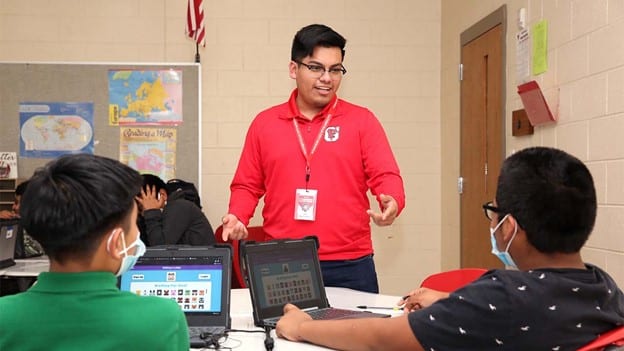
The University of North Georgia’s (UNG) College of Education is launching its teacher candidate residency program in fall 2022, in partnership with the Gainesville City and Hall County school districts.
The program allows preservice teachers enrolled in a UNG teacher preparation program to be hired by school districts to be full-time teachers during their senior year.
The program is meant to replace traditional student teaching, and these students are paid half the standard teaching salary, which amounts to about $23,000 annually.
14 Feb2022
By Sumi Hagiwara
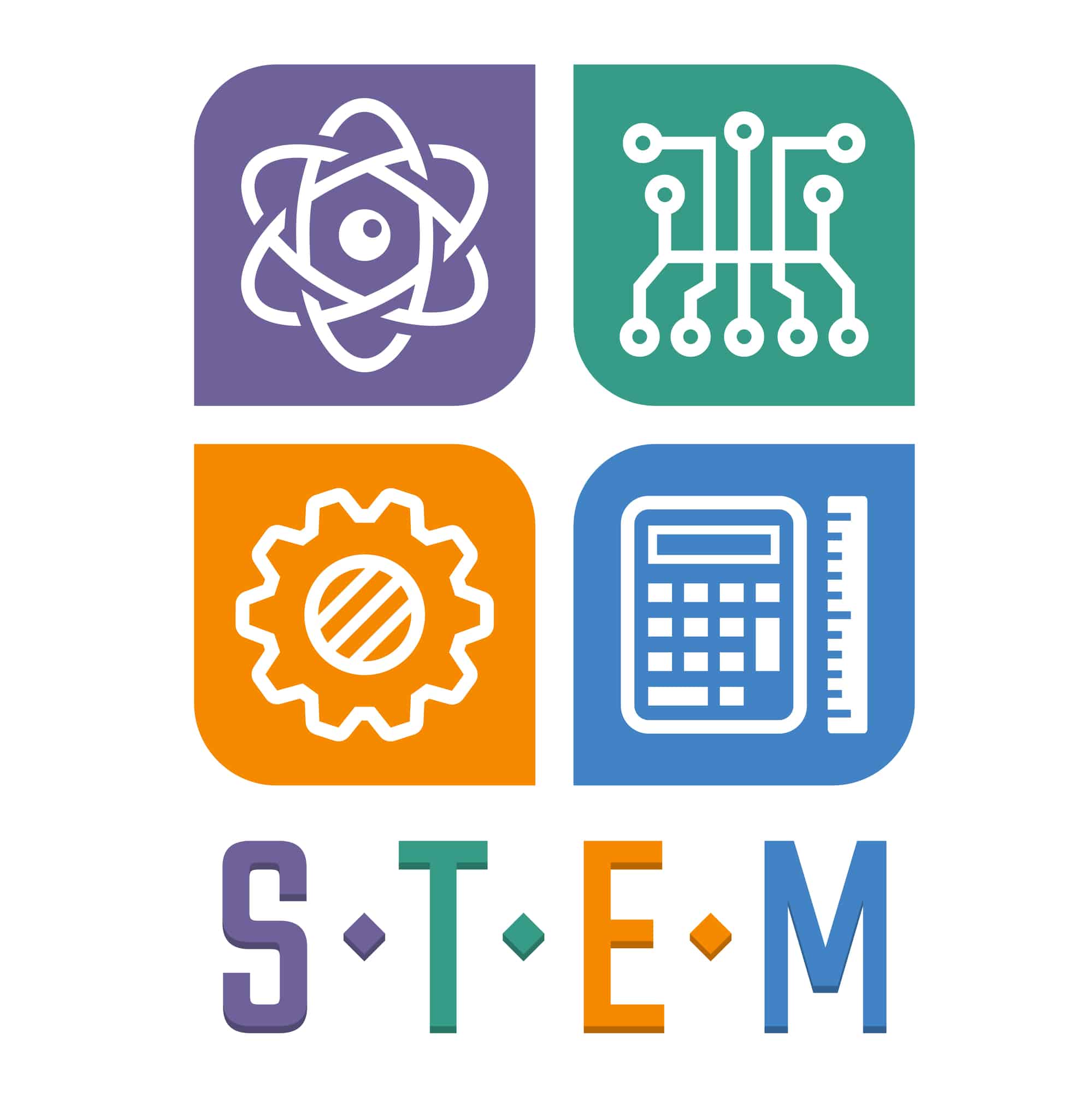 The Improving Practices in STEM Teacher Preparation (IPSTP) Topical Action Group (TAG) is hosting an Invited Speakers Event on Thursday, Mar 3, 2022, from 4:00 – 6:00 pm. The in-person meeting will take place at in the Lafayette room at New Orleans Marriott. A Zoom link will be shared via email to respondents. Please RSVP here.
The Improving Practices in STEM Teacher Preparation (IPSTP) Topical Action Group (TAG) is hosting an Invited Speakers Event on Thursday, Mar 3, 2022, from 4:00 – 6:00 pm. The in-person meeting will take place at in the Lafayette room at New Orleans Marriott. A Zoom link will be shared via email to respondents. Please RSVP here.
11 Feb2022
By Fernanda Pires and Danielle Dimcheff
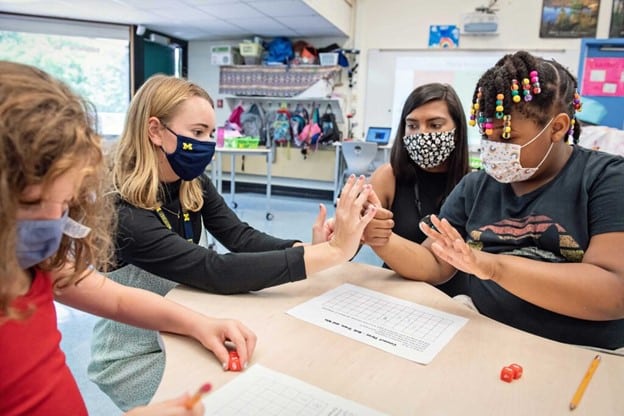
Students in the Master of Arts with Elementary Teacher Certification program work with elementary school students at Ann Arbor Open School in July 2021. Image credit: Leisa Thompson
With a $14.7 million gift, University of Michigan alumna Eileen Lappin Weiser will establish a new center at the U-M School of Education to make learning accessible to all youth.
Her gift, representing the largest commitment in the School of Education’s 100-year history, will help reshape teaching and learning to meet the needs of all different kinds of learners and prepare them for the jobs of the future.
The Eileen Lappin Weiser Learning Sciences Center will strengthen the connections between research and practice by engaging numerous partners to study the many places and ways that learning happens. This will involve the design and testing of curricula for diverse learners, collaboration with teachers and administrators to promote evidence-based practices, and efforts to scale successful education solutions to be available to all learners.
28 Jan2022
By Jacqueline Rodriguez
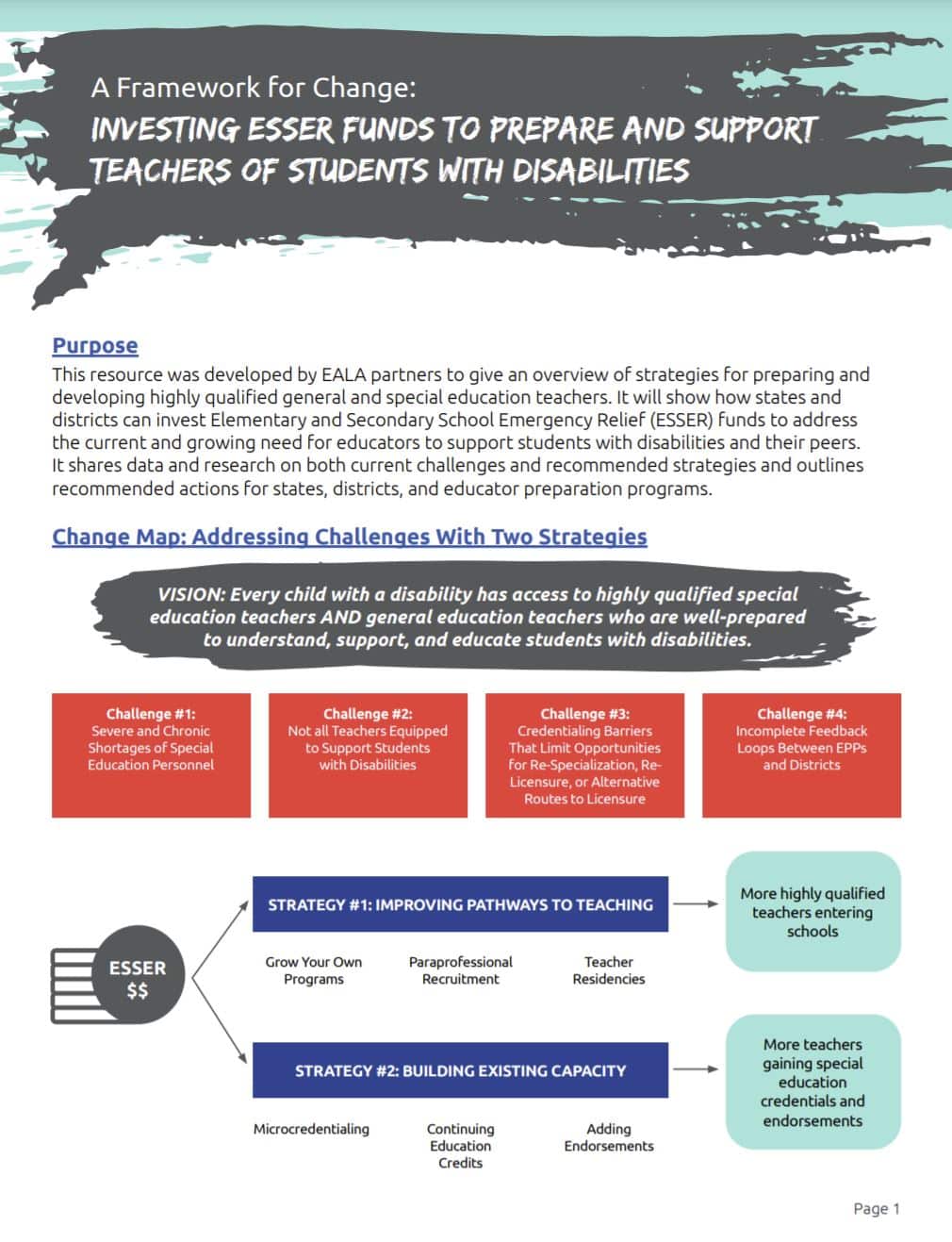 AACTE joined the Educating All Learners Alliance (EALA) in 2020 as the pandemic gave rise to the growing challenges to teaching students with learning differences online. The Alliance steadfastly supports PK-20 students through resource development, including the newest resource: A Framework for Change: Investing ESSER Funds to Prepare and Support Teachers of Students With Disabilities.
AACTE joined the Educating All Learners Alliance (EALA) in 2020 as the pandemic gave rise to the growing challenges to teaching students with learning differences online. The Alliance steadfastly supports PK-20 students through resource development, including the newest resource: A Framework for Change: Investing ESSER Funds to Prepare and Support Teachers of Students With Disabilities.
This resource was developed by EALA partners to give an overview of strategies for preparing and developing highly qualified general and special education teachers. It will show how states and districts can invest Elementary and Secondary School Emergency Relief (ESSER) funds to address the current and growing need for educators to support students with disabilities and their peers. It shares data and research on both current challenges and recommended strategies and outlines recommended actions for states, districts, and educator preparation programs.
25 Jan2022
By Margaret Gerry
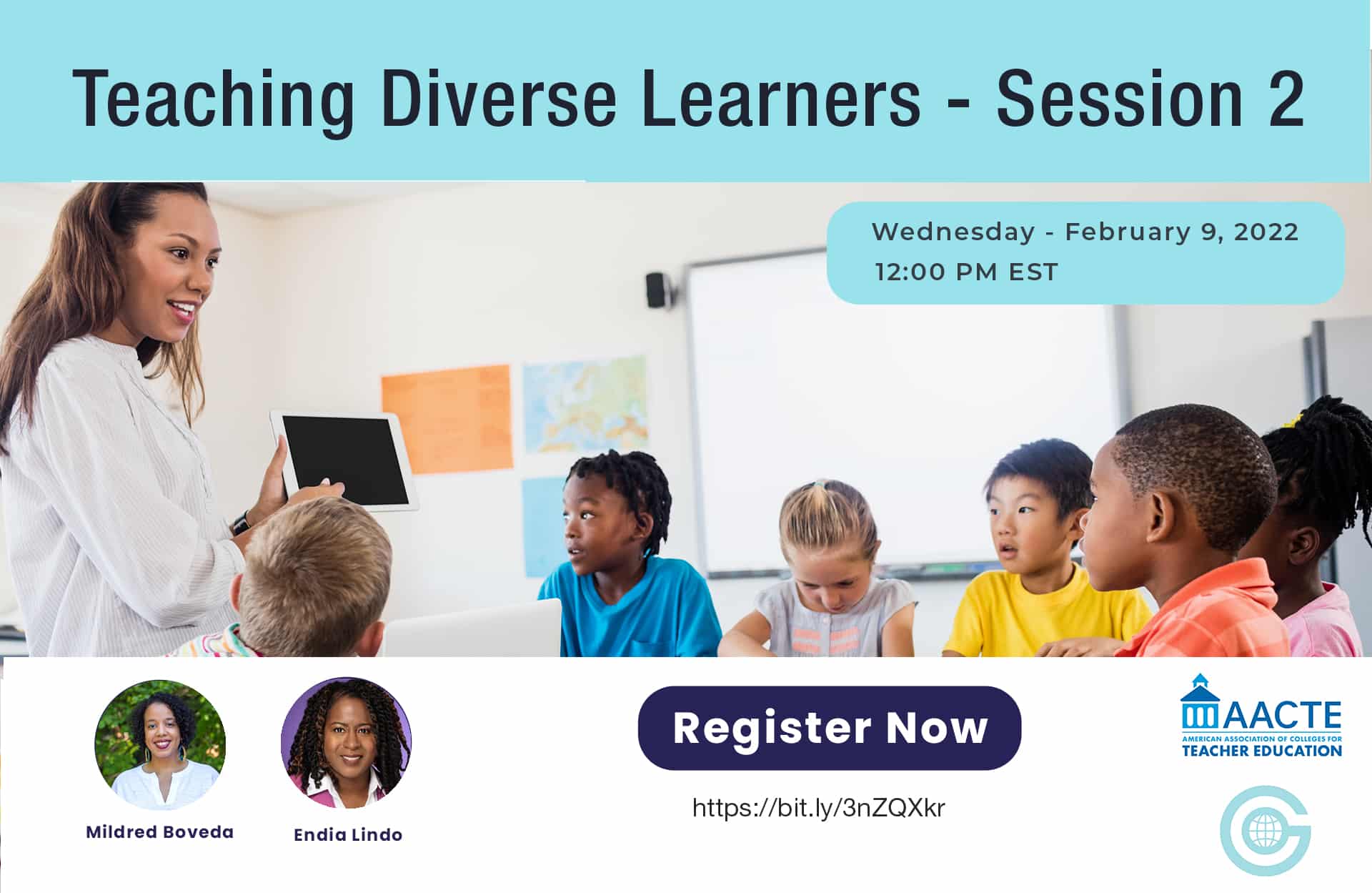 The current demographics in the United States public school workforce are not representative of all students in American classroom settings. Though American classroom settings continue to grow in diversity, the teaching workforce remains predominantly white, middle class, and female. These racial inequalities in classroom settings may lead to biases, stereotype threats, and a need for more inclusive environments, thereby impacting student experiences in school settings in areas such as grades, disciplinary referrals, and teacher expectations of students. Across the field of education, stakeholders, including AACTE, are attempting to diversify the field in an attempt to improve the ability of our current teaching workforce to support their students who have different experiences from their own. In an era where, in the United States, our classrooms have never been more diverse with students from multiple cultures, socio-economic levels, and students with disabilities, how can we best prepare teachers to support all students in classroom settings?
The current demographics in the United States public school workforce are not representative of all students in American classroom settings. Though American classroom settings continue to grow in diversity, the teaching workforce remains predominantly white, middle class, and female. These racial inequalities in classroom settings may lead to biases, stereotype threats, and a need for more inclusive environments, thereby impacting student experiences in school settings in areas such as grades, disciplinary referrals, and teacher expectations of students. Across the field of education, stakeholders, including AACTE, are attempting to diversify the field in an attempt to improve the ability of our current teaching workforce to support their students who have different experiences from their own. In an era where, in the United States, our classrooms have never been more diverse with students from multiple cultures, socio-economic levels, and students with disabilities, how can we best prepare teachers to support all students in classroom settings?
20 Jan2022
By Katrina Norfleet
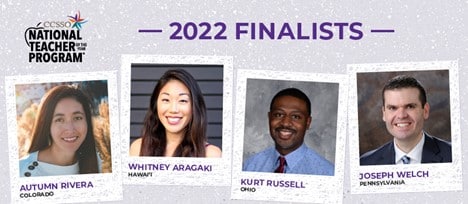
The Council of Chief State School Officers (CCSSO) has announced four exemplary educators from across the country as finalists for 2022 National Teacher of the Year, all of whom have been prepared for teacher education by AACTE member institutions:
18 Jan2022
By Margaret Gerry
 The current and historical public-school workforce in the United States remains predominantly white, middle class, and female; however, these demographics have never accurately represented all students in American classroom settings, which continue to grow in diversity. Classrooms are a place where the presence of biases, stereotype threats, and need for more inclusive environments resulting from differences between the demographics and lived experiences of the teaching workforce and students exist. While AACTE and other education stakeholders are taking up efforts to diversify the field, it is essential to improve the ability of our current educator workforce. In the United States, our classrooms have never been more diverse with students from multiple cultures, socio-economic levels, and disabilities. Thus, the essential question remains: How can we best prepare teachers to support all students in our classroom settings?
The current and historical public-school workforce in the United States remains predominantly white, middle class, and female; however, these demographics have never accurately represented all students in American classroom settings, which continue to grow in diversity. Classrooms are a place where the presence of biases, stereotype threats, and need for more inclusive environments resulting from differences between the demographics and lived experiences of the teaching workforce and students exist. While AACTE and other education stakeholders are taking up efforts to diversify the field, it is essential to improve the ability of our current educator workforce. In the United States, our classrooms have never been more diverse with students from multiple cultures, socio-economic levels, and disabilities. Thus, the essential question remains: How can we best prepare teachers to support all students in our classroom settings?
18 Jan2022
By Anna Oakes
This article originally appeared on the Appalachian Today website.
Appalachian State University is partnering with Elkin City Schools to open the university’s second laboratory school aimed at enhancing student education, improving outcomes,and providing high-quality teacher and principal training.
Under the plan — which was developed in collaboration with Elkin City Schools leaders and approved by the Elkin City Schools Board of Education on Dec. 13, 2021 — a lab school will open at Elkin Elementary School in August. The “school-within-a-school” model will serve approximately 100 students in second through fourth grades.
11 Jan2022
By Nicole Dunn
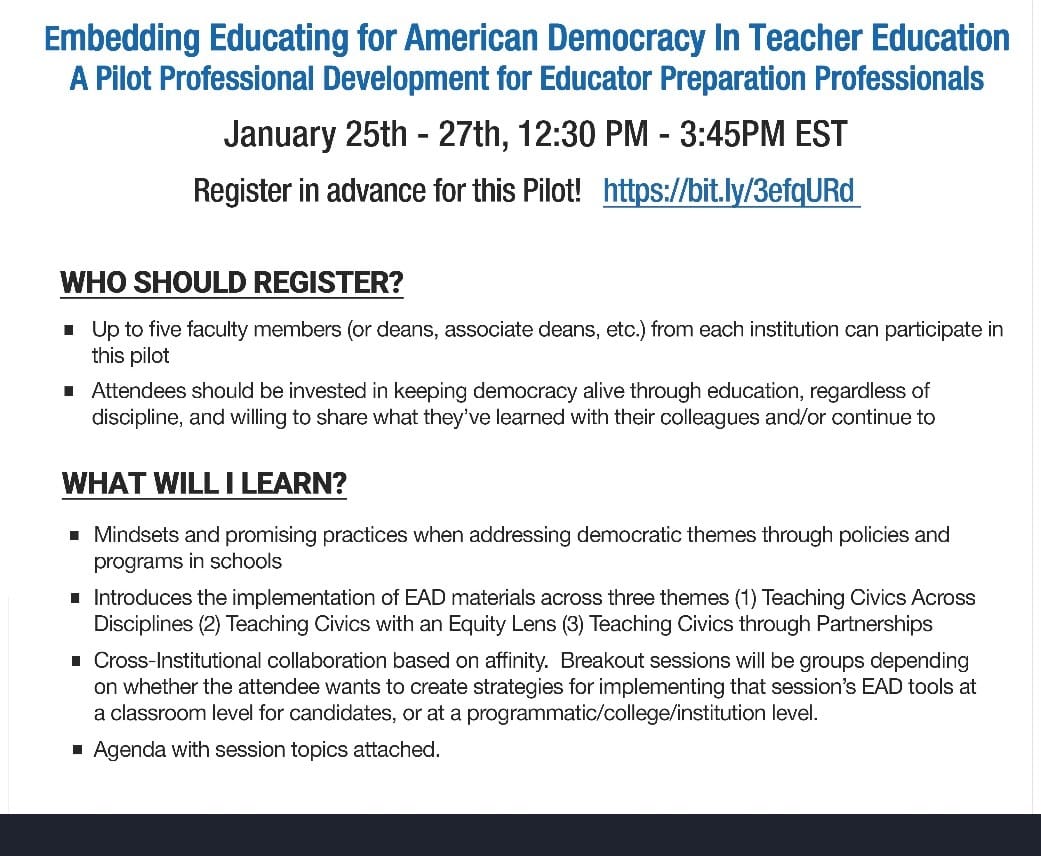 Historical tensions and the bipartisan polarization of many topics deemed essential to a well-rounded, inclusive civic education has made teachers, especially those just entering the classroom, hesitant to engage students in civics in their classrooms. However, civic inquiry should be introduced early and often, by incorporating these frameworks across subject areas.
Historical tensions and the bipartisan polarization of many topics deemed essential to a well-rounded, inclusive civic education has made teachers, especially those just entering the classroom, hesitant to engage students in civics in their classrooms. However, civic inquiry should be introduced early and often, by incorporating these frameworks across subject areas.
AACTE has partnered with iCivics and Educating for American Democracy (EAD) as part of its efforts to ensure every educator is prepared to help students understand the pillars and principles of democratic society and be engaged citizens regardless of their background and discipline.
03 Jan2022
By A-State News
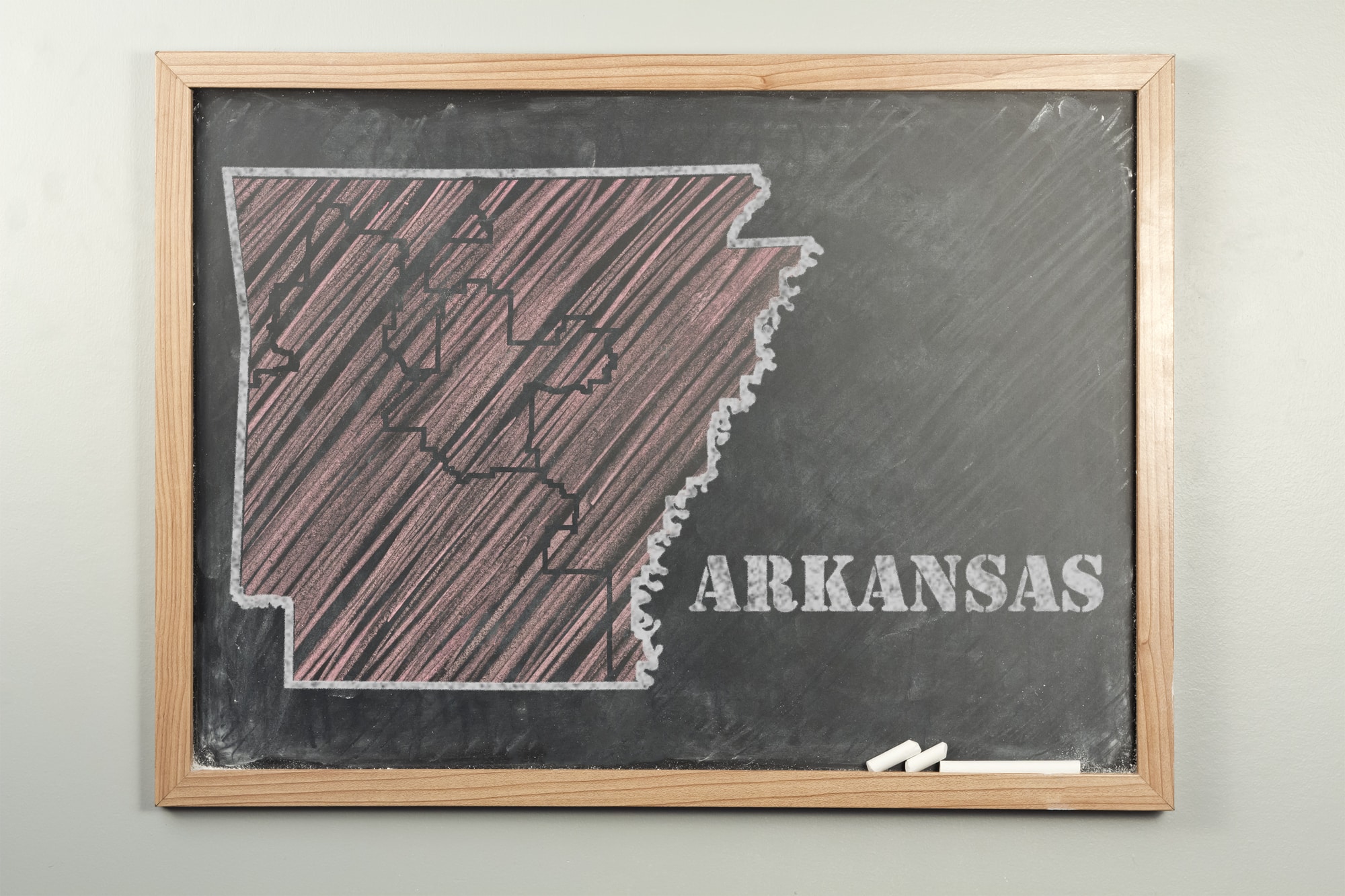 Arkansas State University is one of eight Arkansas universities participating in a program designed to help transform K-12 teacher recruitment, training and retention, according to Forward Arkansas, a non-profit organization leading an effort to recruit and retain qualified K-12 teachers.
Arkansas State University is one of eight Arkansas universities participating in a program designed to help transform K-12 teacher recruitment, training and retention, according to Forward Arkansas, a non-profit organization leading an effort to recruit and retain qualified K-12 teachers.
A-State joins Arkansas Tech University, Harding University, Southern Arkansas University, University of Arkansas at Fort Smith, University of Arkansas at Little Rock, University of Arkansas at Pine Bluff and University of Central Arkansas in the project.
14 Dec2021
By Michael Rose
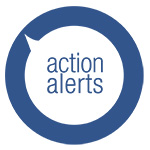
Senator Jack Reed (D-R.I.) and Representative Alma Adams (D-N.C.) recently introduced the Educators for America Act, which would modernize Title II of the Higher Education Act and help ensure that future teachers are profession-ready to enter the classroom. The Educators for America Act was introduced after more than a year of consultations with experts in the educator field and partner organizations.
Action Needed
Now we must use our voice to build support and momentum behind the bill.
Urge your representative and senators to co-sponsor the Educators for America Act via AACTE’s Action Center.








 The Improving Practices in STEM Teacher Preparation (IPSTP) Topical Action Group (TAG) is hosting an Invited Speakers Event on Thursday, Mar 3, 2022, from 4:00 – 6:00 pm. The in-person meeting will take place at in the Lafayette room at New Orleans Marriott. A Zoom link will be shared via email to respondents. Please
The Improving Practices in STEM Teacher Preparation (IPSTP) Topical Action Group (TAG) is hosting an Invited Speakers Event on Thursday, Mar 3, 2022, from 4:00 – 6:00 pm. The in-person meeting will take place at in the Lafayette room at New Orleans Marriott. A Zoom link will be shared via email to respondents. Please 
 AACTE
AACTE  The current demographics in the United States public school workforce are not representative of all students in American classroom settings. Though American classroom settings continue to grow in diversity, the teaching workforce remains predominantly white, middle class, and female. These racial inequalities in classroom settings may lead to biases, stereotype threats, and a need for more inclusive environments, thereby impacting student experiences in school settings in areas such as grades, disciplinary referrals, and teacher expectations of students. Across the field of education, stakeholders, including AACTE, are attempting to diversify the field in an attempt to improve the ability of our current teaching workforce to support their students who have different experiences from their own. In an era where, in the United States, our classrooms have never been more diverse with students from multiple cultures, socio-economic levels, and students with disabilities, how can we best prepare teachers to support all students in classroom settings?
The current demographics in the United States public school workforce are not representative of all students in American classroom settings. Though American classroom settings continue to grow in diversity, the teaching workforce remains predominantly white, middle class, and female. These racial inequalities in classroom settings may lead to biases, stereotype threats, and a need for more inclusive environments, thereby impacting student experiences in school settings in areas such as grades, disciplinary referrals, and teacher expectations of students. Across the field of education, stakeholders, including AACTE, are attempting to diversify the field in an attempt to improve the ability of our current teaching workforce to support their students who have different experiences from their own. In an era where, in the United States, our classrooms have never been more diverse with students from multiple cultures, socio-economic levels, and students with disabilities, how can we best prepare teachers to support all students in classroom settings?
 The current and historical public-school workforce in the United States remains predominantly white, middle class, and female; however, these demographics have never accurately represented all students in American classroom settings, which continue to grow in diversity. Classrooms are a place where the presence of biases, stereotype threats, and need for more inclusive environments resulting from differences between the demographics and lived experiences of the teaching workforce and students exist. While AACTE and other education stakeholders are taking up efforts to diversify the field, it is essential to improve the ability of our current educator workforce. In the United States, our classrooms have never been more diverse with students from multiple cultures, socio-economic levels, and disabilities. Thus, the essential question remains: How can we best prepare teachers to support all students in our classroom settings?
The current and historical public-school workforce in the United States remains predominantly white, middle class, and female; however, these demographics have never accurately represented all students in American classroom settings, which continue to grow in diversity. Classrooms are a place where the presence of biases, stereotype threats, and need for more inclusive environments resulting from differences between the demographics and lived experiences of the teaching workforce and students exist. While AACTE and other education stakeholders are taking up efforts to diversify the field, it is essential to improve the ability of our current educator workforce. In the United States, our classrooms have never been more diverse with students from multiple cultures, socio-economic levels, and disabilities. Thus, the essential question remains: How can we best prepare teachers to support all students in our classroom settings? Historical tensions and the bipartisan polarization of many topics deemed essential to a well-rounded, inclusive civic education has made teachers, especially those just entering the classroom, hesitant to engage students in civics in their classrooms. However, civic inquiry should be introduced early and often, by incorporating these frameworks across subject areas.
Historical tensions and the bipartisan polarization of many topics deemed essential to a well-rounded, inclusive civic education has made teachers, especially those just entering the classroom, hesitant to engage students in civics in their classrooms. However, civic inquiry should be introduced early and often, by incorporating these frameworks across subject areas. Arkansas State University is one of eight Arkansas universities participating in a program designed to help transform K-12 teacher recruitment, training and retention, according to Forward Arkansas, a non-profit organization leading an effort to recruit and retain qualified K-12 teachers.
Arkansas State University is one of eight Arkansas universities participating in a program designed to help transform K-12 teacher recruitment, training and retention, according to Forward Arkansas, a non-profit organization leading an effort to recruit and retain qualified K-12 teachers.